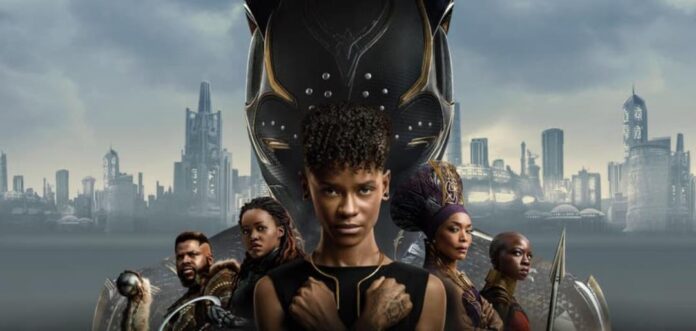Black Panther: Wakanda Forever feels less like a movie about super heroics and more like one about power and ethics and the patterns of escalation in war. With superpowers as a catalyst, the movie gets itself into one of Marvel’s most fascinating messes. It retains the franchise’s signature super-battles — everything from one-on-one melees to all-out war — but its more realized politics give these conflicts a fascinating weight that I’ve never felt in a Marvel project before.
Perhaps the most significant part of this movie’s development was the 2020 passing of Chadwick Boseman, who played the Black Panther T’Challa in Black Panther (2018) and all of the character’s MCU appearances from 2016 to 2019. For a franchise as character-driven as the MCU, completing a Black Panther sequel after Boseman’s death seems to demand the impossible. It makes sense that T’Challa remains central in some way to the stories that bear his name, but aside from some flashback material made with archival footage, Boseman is not present in the movie. Instead, Wakanda Forever builds its hook from the actor’s legacy. T’Challa’s essence drives the film forward from within the characters who love him.
Forced by necessity into a place of power vacated by her brother, T’Challa’s sister Shuri (Letitia Wright) tackles an ever expanding list of challenges that threaten her and her people. She faces questionable desires that warp and eclipse her sense of morality as she is shoved to her breaking point again and again, through ordeal after ordeal after ordeal. She makes mistakes as a leader, and those under her leadership reap the consequences with her as Wakanda once again finds itself under scrutiny on the world stage. She remains desperately human, and understanding her plight makes it all the more heartbreaking to watch her and her people suffer under a conflict that escalates in part from third-party greed and a mutual desire for peace.
Wakanda Forever’s most dire battle felt like a lose-lose scenario, as I found myself hoping for once that the conflict could end for the sake of everyone the movie made me care about. This may not seem overly revolutionary in concept, but it’s certainly the first time I’ve experienced anything besides an “ooooohh go get ?em” attitude towards the outcome of an MCU superhero war. Nameless character deaths suddenly retain meaning as they prove to be fodder for a conflict that nobody really wants. Yes, everyone with a name is still badass, but their feats in battle suddenly carry the weight of actual recognized life. For the first time, the stakes and consequences of such a battle align upon a shared appreciation, between the warring parties, of the life they swear to protect.
The movie packs its 2 hour and 41 minute runtime with scenarios like this, that compound to the point where I genuinely had no idea how it could possibly resolve everything with the time it had remaining. In fact, with so much time spent building its web of conflict, the movie gives itself little space to properly end, so it attempts a quick resolution that leaves a lot of problems unresolved, unsurprisingly, going through the motions any Marvel fan can recognize as the setup to yet another story. With so much unsolved material, I can easily imagine the movie running for an additional half hour to fully wrap things up. At the end of the day, though, it pays Disney to keep the story rolling, and unsatisfying loose ends are a worryingly effective marketing trick.
Like most Marvel projects, Wakanda Forever creates a minor technobabble explanation of its superpowers and associated technology before accepting a “why over how” attitude. Unlike its companions on the MCU timeline though, it takes literal ownership of the phrase and extends the attitude to encompass how its titular characters experience its world and each other. The movie may not resolve everything, and it certainly has its fair share of issues, but it’s the first MCU property that I’ve felt comfortable recommending because of the world it builds rather than just the characters that inhabit it. For something within a franchise that often neglects nuance in favor of badassery, Wakanda Forever feels refreshingly profound.


